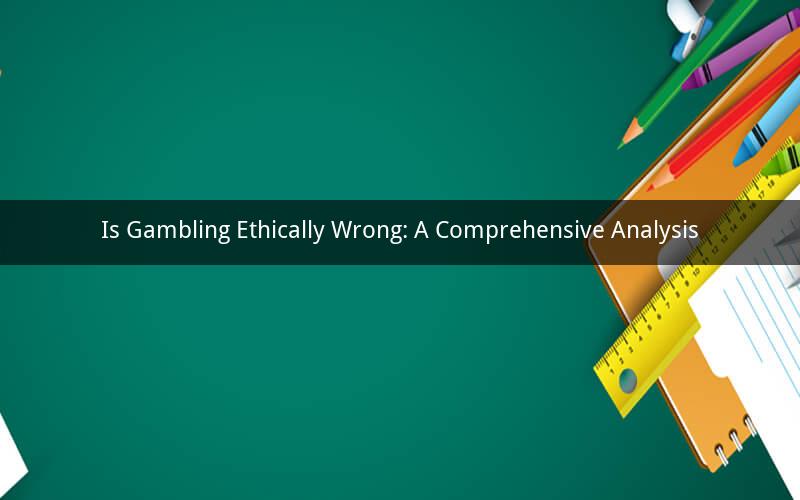
Introduction:
Gambling, an activity that has been around for centuries, continues to be a topic of debate and controversy. With the rise of online gambling and its accessibility, the ethical implications of this activity have become even more prominent. This article delves into the question of whether gambling is ethically wrong, examining various perspectives and arguments.
1. Understanding Ethics in Gambling:
Ethics, in the context of gambling, revolves around the moral principles that govern the behavior of individuals involved in this activity. It encompasses fairness, honesty, and the potential harm caused to individuals and society as a whole.
2. The Argument for Ethical Gambling:
Proponents of ethical gambling argue that gambling, when conducted responsibly, can be a harmless and enjoyable activity. They emphasize the importance of personal choice, self-regulation, and the potential benefits that gambling can bring to individuals and communities.
a. Personal Benefits:
Gambling can provide individuals with entertainment, excitement, and the opportunity to win money. It can also serve as a form of stress relief and a means of social interaction.
b. Community Benefits:
Gambling can contribute to economic growth, generating revenue for governments and communities. It can create job opportunities, fund public services, and support local businesses.
3. The Argument Against Ethical Gambling:
Critics of gambling argue that it is inherently unethical due to its potential for harm, addiction, and exploitation. They highlight the following concerns:
a. Addiction:
Gambling addiction is a serious issue that can lead to significant harm to individuals and their families. It can cause financial, emotional, and psychological distress, as well as strained relationships.
b. Exploitation:
Gambling can be a source of exploitation, particularly when individuals are vulnerable or in vulnerable situations. This includes minors, individuals with mental health issues, and those in debt.
c. Social Costs:
Gambling can have negative social consequences, such as crime, gambling-related debt, and the destruction of communities. It can also lead to an increase in gambling-related problems, including addiction, theft, and fraud.
4. Ethical Considerations:
When evaluating the ethical implications of gambling, several factors come into play:
a. Consent:
For gambling to be considered ethical, individuals must have the freedom to make informed choices about their participation. This includes being aware of the risks and consequences associated with gambling.
b. Fairness:
Ethical gambling should ensure fairness and transparency in the game, with no advantage given to either the gambler or the gambling operator.
c. Protection:
Ethical gambling should prioritize the protection of vulnerable individuals, ensuring that they are not exploited or taken advantage of.
5. Conclusion:
The question of whether gambling is ethically wrong is complex and multifaceted. While some argue that gambling can be an enjoyable and harmless activity when conducted responsibly, others emphasize the potential harm, addiction, and exploitation associated with it. Ultimately, the ethical considerations surrounding gambling revolve around personal choice, protection, and the potential societal impact.
Questions and Answers:
1. What are the potential benefits of gambling?
Gambling can provide entertainment, excitement, and the opportunity to win money. It can also contribute to economic growth, generate revenue for governments, and create job opportunities.
2. Can gambling be addictive?
Yes, gambling can be addictive. It can lead to significant harm, including financial, emotional, and psychological distress, as well as strained relationships.
3. How can gambling be made ethical?
Gambling can be made ethical by ensuring fairness, transparency, and protection for individuals. This includes informed consent, self-regulation, and measures to prevent addiction and exploitation.
4. Is online gambling more ethical than traditional gambling?
The ethical considerations of online gambling and traditional gambling are similar. Both should prioritize fairness, transparency, and protection for individuals, regardless of the platform.
5. Can gambling be considered a form of entertainment?
Yes, gambling can be considered a form of entertainment. However, it is important to approach it responsibly and be aware of the potential risks and consequences associated with it.